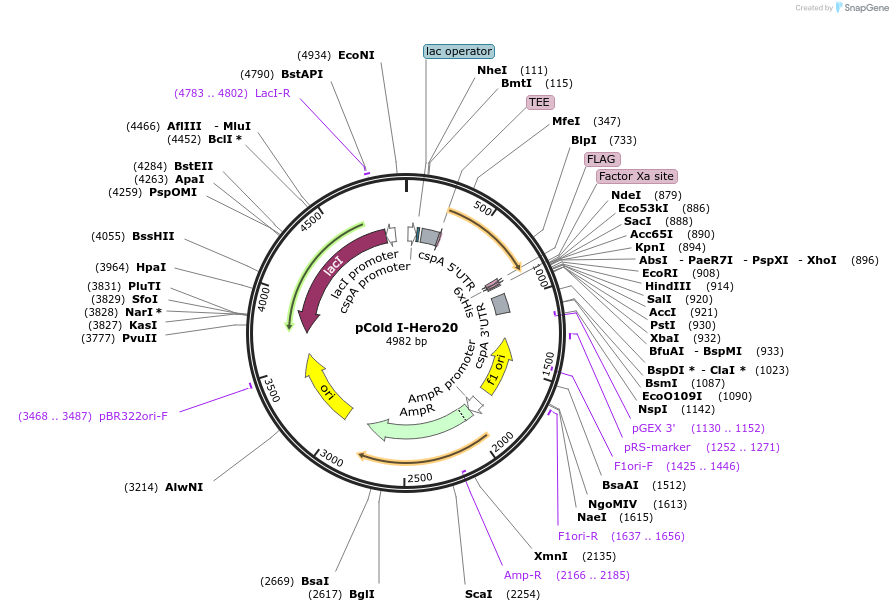pCold I-Hero20
(Plasmid
#187930)
-
PurposeBacterial expression of heat-resistant obscure (Hero) protein Hero20
-
Depositing Lab
-
Sequence Information
Ordering
| Item | Catalog # | Description | Quantity | Price (USD) | |
|---|---|---|---|---|---|
| Plasmid | 187930 | Standard format: Plasmid sent in bacteria as agar stab | 1 | $89 | |
Backbone
-
Vector backbonepCold I
-
Backbone manufacturerTakara
-
Vector typeBacterial Expression
Growth in Bacteria
-
Bacterial Resistance(s)Ampicillin, 100 μg/mL
-
Growth Temperature37°C
-
Growth Strain(s)DH5alpha
-
Copy numberHigh Copy
Gene/Insert
-
Gene/Insert nameHero20
-
Alt nameC11orf58
-
Alt nameSmall acidic protein
-
SpeciesH. sapiens (human)
-
Entrez GeneC11orf58 (a.k.a. SMAP, MGC117265, IMAGE145052, DKFZp686N0232)
-
Tag
/ Fusion Protein
- Flag-6xHis (C terminal on insert)
Cloning Information
- Cloning method Gibson Cloning
Resource Information
-
Supplemental Documents
Terms and Licenses
-
Academic/Nonprofit Terms
-
Industry Terms
- Not Available to Industry
Trademarks:
- Zeocin® is an InvivoGen trademark.
Depositor Comments
Also refer to Morimoto et al. (2022) "Fusion with heat-resistant obscure (Hero) proteins have the potential to improve the molecular property of recombinant proteins" bioRxiv. https://doi.org/10.1101/2022.03.03.482928
These plasmids were created by your colleagues. Please acknowledge the Principal Investigator, cite the article in which the plasmids were described, and include Addgene in the Materials and Methods of your future publications.
-
For your Materials & Methods section:
pCold I-Hero20 was a gift from Yukihide Tomari (Addgene plasmid # 187930 ; http://n2t.net/addgene:187930 ; RRID:Addgene_187930) -
For your References section:
A widespread family of heat-resistant obscure (Hero) proteins protect against protein instability and aggregation. Tsuboyama K, Osaki T, Matsuura-Suzuki E, Kozuka-Hata H, Okada Y, Oyama M, Ikeuchi Y, Iwasaki S, Tomari Y. PLoS Biol. 2020 Mar 12;18(3):e3000632. doi: 10.1371/journal.pbio.3000632. eCollection 2020 Mar. 10.1371/journal.pbio.3000632 PubMed 32163402



